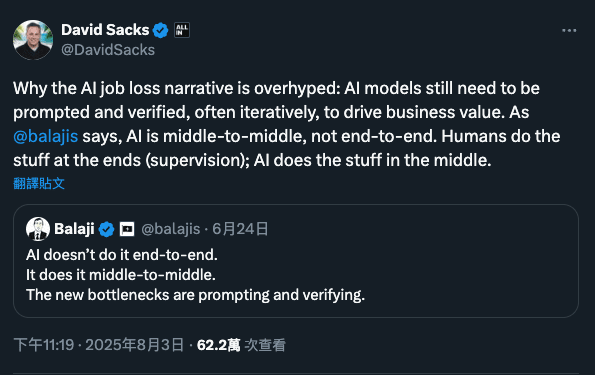Microsoft report: The 40 jobs most suitable for AI
According to a report by Fortune magazine, Microsoft researchers recently published a study listing 40 types of jobs suitable for AI, meaning those professions that are most aligned with the current capabilities of generative AI, with roles such as translators, historians, and writers ranking at the top.
The study analyzed 200,000 real Copilot user conversations and cross-referenced AI performance with occupational data.
Microsoft report: The 40 jobs most suitable for AI
Interpreters and translators
Historians
Passenger service agents
Service industry sales representatives
Writers and authors
Customer service representatives
CNC tool programmers
Telephone operators
Ticket agents and travel agents
Radio hosts and DJs
Securities agents
Farm and family management educators
Telemarketers
Concierge personnel
Political scientists
News analysts, journalists, news workers
Mathematicians
Technical writers
Proofreaders and text markers
Male and female waitstaff
Editors
Business teachers (higher education)
Public relations specialists
Demonstrators and product promoters
Advertising sales agents
New account representatives
Statistical assistants
Counter and leasing agents
Data scientists
Personal financial advisors
Archivists
Economics teachers (higher education)
Web developers
Management analysts
Geographers
Models
Market research analysts
Public safety telecommunicators
Telephone operators
Library science teachers (higher education)
Jobs that require practical operation of equipment are less affected.
Microsoft report: The 10 jobs least suitable for AI
Dredging machine operator
Bridge and lock operators
Water treatment plant and system operators
Casting mold and core manufacturers
Railway laying and maintenance equipment operators
Pile driver operators
Floor sanding and polishing workers
Nurses
Jet ski operators
Logging equipment operators
Higher education and the education sector are no longer a workplace safety net?
Microsoft's research found that many high-risk professions, such as political scientists, journalists, and management analysts, typically require a four-year university degree to qualify.
Microsoft researchers pointed out: 'In terms of educational requirements, we found that professions requiring a bachelor's degree have a higher AI suitability compared to those with lower educational requirements.'
Additionally, many Generation Z individuals, after witnessing the wave of layoffs in the tech industry, are turning to seemingly more stable fields like education.
However, Microsoft's research shows that positions such as farm and family management educators, as well as economics, business, and library science teachers in higher education, also possess relatively high AI suitability scores.
Nonetheless, the healthcare sector continues to show counter-cyclical growth. According to data from the U.S. Bureau of Labor Statistics, the home health and personal care assistant industry is expected to create the most new job opportunities in the next decade.
Crypto czar: The discourse on AI replacing jobs is overly exaggerated
Many media outlets and experts have begun to interpret Microsoft's research report, believing that the professions they listed will be replaced by AI in the future.
For example, the human resources platform Indeed states that large companies like IBM have been freezing thousands of potential new positions, with AI expected to take over these positions in the next five years; while graduates in the UK are facing the worst job market since 2018, as employers pause hiring and utilize AI to cut costs.
In this regard, White House AI and cryptocurrency czar David Sacks has a different view.
He stated on the X platform (formerly Twitter), 'The claim that AI will replace jobs is overly exaggerated,' emphasizing that AI still requires human prompts and verification to generate real business value.
Sacks pointed out that AI is responsible for handling intermediary tasks, but humans still need to manage the end-to-end processes.
He cited the opinion of former Coinbase CTO Balaji Srinivasan, stating: 'Today's AI does not truly possess autonomy, as it is not truly independent of you,' and added: 'AI will not take your job, but will enable you to perform any job.'
Further reading:
Former Coinbase CTO: AI accelerates creation, but verification costs become the real bottleneck
 Source: X White House AI Crypto Czar: The discourse on AI replacing jobs is overly exaggerated
Source: X White House AI Crypto Czar: The discourse on AI replacing jobs is overly exaggerated
AI will only replace the previous generation of AI
When discussing the possibilities of AI, former Coinbase CTO Balaji Srinivasan once illustrated:
'For example, Midjourney replaced the work of Stable Diffusion, and GPT-4 replaced the work of GPT-3. Once you assign a position in the workflow for AI image generation, AI code generation, etc., you are merely reallocating expenses to the latest model. Therefore, AI replaces the work of the previous generation of AI.'
Microsoft senior researcher Kiran Tomlinson also told the media that the focus of this research is to highlight how AI could change the way we work, rather than replace or substitute jobs.
He emphasized: 'Our research shows that AI can assist with many tasks, especially those involving research, writing, and communication, but that does not mean it can fully execute any single profession.'
Further reading:
AI colleagues will be on board! Experts: By 2028, 15% of daily work will be autonomously completed by AI
‘Microsoft report interpreted: AI may replace 40 types of jobs! Crypto czar complains 'it's too exaggerated'’ This article was first published in ‘Crypto City’

